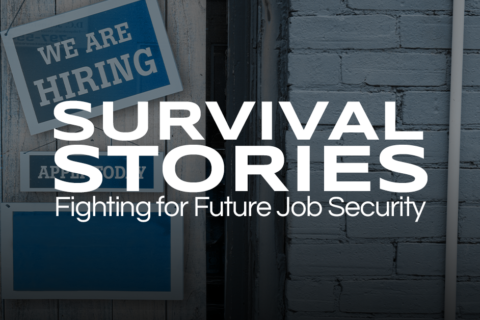Survival Stories: Ex- Yellow Employee’s Fight for Future Job Security
Riding the Wave of Change: Yellow Trucking’s Unexpected Shutdown The winds of change are sweeping through America’s workforce with increasing frequency. In a stunning development, Yellow, a stalwart in the trucking industry since 1922, abruptly shut its doors, leaving its 30,000 employees, including drivers like 32-year veteran truck driver Mark Roper, without jobs or severance packages. In this post, we’ll explore the far-reaching effects of this significant corporate closure on Yellow’s former employees. Navigating New Horizons: Job Hunt After Yellow With Yellow now a part of trucking history, many like Mark Roper are scouting for new employment opportunities. Currently, Roper is eyeing union trucking positions at companies such as UPS, ABF Freight, and TForce. One subsector catching his interest is less-than-truckload (LTL) trucking, which allows drivers to return home every night and spend time with their families. However, LTL positions are becoming increasingly rare in the industry. Battling for Balance: The Rise of Truckload Jobs In contrast to LTL trucking, truckload carriers transport full trailers of freight, often requiring drivers to stay on the road for extended periods. These positions typically experience higher turnover rates, ranging from 55% to 60%, with some companies even reaching 100%. Despite this, the current demand for truck drivers is high, and many truckload carriers are actively recruiting new talent. Weighing the Options: Family or Career For Mark Roper, the decision to join a truckload carrier is difficult. After recently losing his mother and stepfather to Covid, as well as his father earlier this year, the prospect of being away from his family is particularly hard. Roper acknowledges that he might eventually have to accept a truckload carrier position, but it’s a choice he would make reluctantly. Economic Shifts: Consumers Choose Goods Over Services The closure of Yellow reflects broader trends within the travel and tourism sectors, especially concerning the transportation of goods. With a growing preference for purchasing goods over services like travel, Americans are contributing to the slowdown of the trucking industry. This shift led to a 17% decline in LTL shipments between 2021 and 2022. A Clash of Perspectives: Yellow Points Finger at Unions Yellow attributes its demise to ongoing disputes with the Teamsters union, asserting that they were unable to negotiate a new labor agreement. In contrast, the union contends that corporate mismanagement was the primary factor behind Yellow’s downfall and highlights that they offered billions of dollars in concessions to keep the company afloat. Conclusions & Reminders The sudden shutdown of Yellow is a somber reminder of the uncertainties that life can bring, particularly for long-term employees like Mark Roper who now face the challenges of securing new employment amidst personal loss. In these trying times, we extend our support to the former employees of Yellow and encourage them to explore the trucking job opportunities available on our site. With Optimum having been born out of the industry, we stand firm in our commitment to providing stable and welcoming work environment to those looking to continue their careers in the trucking industry and many other thriving industries. Ultimately, everyone deserves the stability and security that a steady job can provide. To all of those affected by Yellow’s closure, we hope for new opportunities, in and outside of trucking, to arise right on time.


Recent Comments